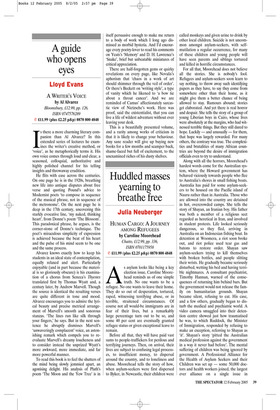A guide who opens eyes
Lloyd Evans
A WRITER’S VOICE by Al Alvarez Bloomsbury, £12.99, pp. 126, ISBN 0747576289 ✆ £11.99 (plus £2.25 p&p) 0870 800 4848 Is there a more charming literary companion than Al Alvarez? In this extended series of lectures he examines the writer’s creative method, or ‘voice’, as he metaphorically terms it. His own voice comes through loud and clear, a seasoned, colloquial, authoritative and highly polished channel for his telling insights and throwaway erudition.
He flits with ease across the centuries. On one page he is in the 1920s, breathing new life into antique disputes about free verse and quoting Pound’s advice to Modernist poets ‘to compose in sequence of the musical phrase, not in sequence of the metronome’. On the next page he is deep in the 17th century, uncovering this starkly evocative line, ‘my naked, thinking heart’, from Donne’s poem ‘The Blossom’. This paradoxical phrase, he argues, is the corner-stone of Donne’s technique. The poet’s miraculous simplicity of expression is achieved because the beat of his heart and the pulse of his mind seem to be one and the same process.
Alvarez knows exactly how to keep his students in an ideal state of contemplation, equally relaxed and alert. Particularly enjoyable (and in part because the material is so gloriously obscure) is his examination of a chorus from Seneca’s Thyestes translated first by Thomas Wyatt and, a century later, by Andrew Marvell. Though the source is identical the resulting verses are quite different in tone and mood. Alvarez encourages you to admire the lyrical beauty and precise metrical arrangement of Marvell’s smooth and sonorous stanzas. ‘The lines run like silk through your fingers,’ he says. But in the next sentence he abruptly dismisses Marvell’s ‘unwaveringly complacent’ voice, an astonishing remark which compels you to reevaluate Marvell’s dreamy loucheness and to consider instead the unprized Wyatt’s more awkward, more immediate, and far more powerful manner.
To read this book is to feel the shutters of the mind being slowly jemmied apart, an agonising delight. His analysis of Plath’s poem ‘The Moon and the Yew Tree’ is in itself persuasive enough to make me return to a body of work which I long ago dismissed as morbid hysteria. And I’d encourage every poetry-lover to read his comments on Yeats’s ‘Memory’ and D. H. Lawrence’s ‘Snake’, brief but unbeatable miniatures of critical appreciation.
There are half-forgotten gems or quirky revelations on every page, like Novalis’s aphorism that ‘chaos in a work of art should shimmer through the veil of order’. Or there’s Beckett on ‘writing style’, a type of vanity which he likened to ‘a bow tie about a throat cancer’. And we are reminded of Camus’ affectionately sarcastic view of Nietzsche’s work. Here was proof, said the existentialist, that you can live a life of wildest adventure without ever leaving your desk.
This is a beautifully presented volume, and a rarity among works of criticism in that it is likely to change your behaviour. Any sane reader will give up buying new books for a few months and scamper back, shame-faced but full of excitement, to the unexamined riches of his dusty shelves.













































 Previous page
Previous page